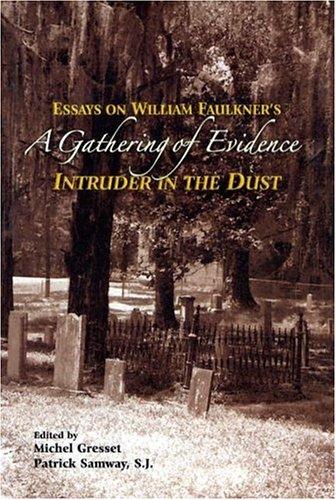
Gathering of Evidence, A; - Essays on William Faulkner's Intruder in the Dust
Price: $34.00
Place Published: Philadelphia
Publisher: Saint Joseph's University Press
Date Published: 2004
ISBN: 0916101460
Book ID: 63
Description:
276 pages
Among the stars in the American literary firmament Faulkner's has remained consistently bright. Whatever litmus test one wants to use, Faulkner's fiction has always been recognized as among the very best ever written in the United States. And thus it is particularly fitting that a volume of 12 essays focusing exclusively on Intruder in the Dust (1948) be made available for the first time to students of Faulkner, of whatever stripe, who wish to appreciate this novel in different contexts and from a variety of perspectives. In short, this volume is a gathering of all sorts of methodological evidence for evaluating a novel that is, in itself, a detective story whose resolution depends upon securing appropriate legal evidence.
A Gathering of Evidence pulls together the best criticism available about a novel that illuminates significant dimensions of Faulkner's short stories and novels. Whatever their approach, the authors in this volume of essays seem to agree on one point: Although this novel is about the education of a young white boy, Chick Mallison, in a racially charged small Southern community, it is Lucas Beauchamp, a black man accused of murdering a white man, who emerges in many seemingly contradictory ways as an important literary figure. Since no one essay can completely exhaust a discussion of the significance of Lucas Beauchamp, these essays, taken together, offer multiple viewpoints that renders the discussion comprehensible and rewarding.
Editor Michel Gresset, Professor Emeritus of American Literature at the Institut d'Anglais Charles V of the University Denis Diderot (Paris VII) in France, has taught at San Diego State University, the University of British Columbia, and Harvard. He is the author of Faulkner ou la Fascination (Klincksieck, 1982, translated as Fascination: Faulkner's Fiction, 1919-1936, Duke University Press, 1989) and the editor of Volume I of the Pléiade edition of Faulkner's works and one of the co-editors of Volume III.
Editor Patrick Samway, S.J., Professor of English at Saint Joseph's University, Philadelphia, Pennsylvania, is the author of Walker Percy: A Life (Farrar, Straus & Giroux; cited by the New York Times as a "notable book" of 1997). He has written a book on the manuscripts and typescripts of Faulkner's Intruder in the Dust and also co-edited with Michel Gresset Faulkner and Ideology: Perspectives from Paris (University Press of Mississippi, 1983).
Essays in this volume include:
The Community in Action - Cleanth Brooks
Man on the Margin: Lucas Beauchamp and the Limitations of Space - Keith Clark
Eunice Habersham's Lessons in Intruder in the Dust - Ikuko Fujihira
Teaching Intruder in the Dust Through Its Political and Historical Context - Robert W. Hamblin
Race Fantasies: The Filming of Intruder in the Dust - Charles Hannon
Negotiating the National Voice in Faulkner's Late Work - Joe Karagani
Faulkner's Comic Narrative of Community - Donald M. Kartiganer
Contextualizing Faulkner's Intruder in the Dust: Sherlock Holmes, Chick Mallison, Decolonization, and Change - Richard C. Moreland
Man in the Middle: Faulkner and the Southern White Moderate - Noel Polk
Intruder in the Dust: A Re-evaluation - Patrick Samway, S.J.
Faulkner and the Post-Confederate - Neil Schmitz
'The Sum of Your Ancestry': Cultural Context and Intruder in the Dust - Evelyn Jaffe Schreiber
CRITICAL ACCLAIM
"This collection of essays on Faulkner's self-proclaimed 'mystery-murder' novel provides a broad range of insights and readings for students and teachers. Although the novel is, in part, about a young white boy, the essays in this volume highlight the significance of Lucas Beauchamp, the African-American character around whom this racial drama actually turns. The novel is examined in political and historical context as well as through the larger lens of detective fiction. Issues such as decolonization, space, national and regional identity, and ancestry are explored, as are film versions of the text."
American Literature (Duke University)



